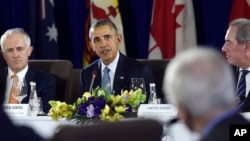Entering its last year in office, the Obama Administration has made it clear that engagement with Asia continues to be a top priority, with an agenda that includes economic, security, and political cooperation with Asian partners.
In 2016, the United States will push for approval of the Trans-Pacific Partnership, a trade agreement between twelve Pacific Rim countries.
The United States will also continue to modernize its alliances and to deepen security relationships with emerging partners.In the Asia-Pacific region, the United States is ready to support its allies in building maritime security, humanitarian disaster relief, and counter-piracy capacity.
“Maritime security and territorial issues will be clearly on the agenda this year as well,” said Deputy National Security Advisor for Strategic Communications Ben Rhodes during a recent speech at the Washington Foreign Press Center.The United States is committed to upholding freedom of navigation, he said. On issues like the South China Sea disputes, we’d like to encourage all parties to de-escalate tensions and resolve their issues through international law.
The United States will also continue to cooperate with China on issues of common interest.
So, for example, “Last year, one of the biggest issues that we focused on domestically and internationally was climate change,” said Mr. Rhodes:
“We would not have achieved the Paris agreement without the cooperation the United States and China had on that issue, both in terms of the announcement made in Beijing during his last trip and the subsequent cooperation leading into Paris.”
“We are going to work very closely with China on a whole range of issues related to the Asia-Pacific,” said Mr. Rhodes.For example, we’ll be working with China through the UN Security Council and also in our own bilateral discussions about how to demonstrate to North Korea that its recent nuclear test and the threat it poses to our allies and to the world, will lead to greater costs, consequences, and isolation.






